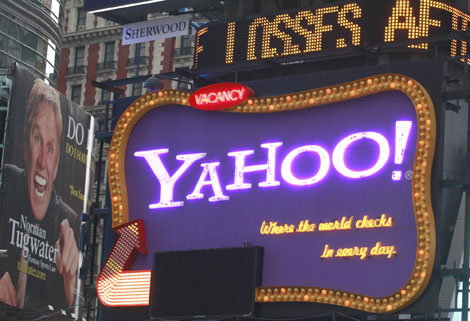
 |
|
A Yahoo billboard is seen in New York's Times Square in this Oct 19, 2010 file photo.[Photo / Agencies] |
Although the group said that it has no timetable for an IPO at the moment, Jack Ma, Alibaba's chairman and chief executive officer, said that the transaction will help the company achieve a balanced ownership structure that will allow it to "take the business to the next level as a public company in the future".
Under the agreement, Alibaba Group will pay Yahoo at least $6.3 billion in cash, plus new preferred shares worth up to $800 million, the companies said in a joint statement.
The Hangzhou-based group will hold about 51 percent of its equity after the transaction. The voting rights of Yahoo and Softbank in Alibaba Group will be diminished to under 50 percent as a result of the deal.
Tokyo-based Softbank Corp owns about 30 percent of Alibaba Group.
Alibaba started out as a business-to-business website linking factories in China to buyers around the world. It also operates Taobao.com, the country's version of eBay, and TMall, which brands can use to sell directly to consumers.
"Alibaba Group regained control in the boardroom through this deal, and the company will be able to formulate its own business strategies," said Qi Jianzhe, an analyst at research company Analysys International.
Ma and Alibaba Group tried several times since last year to buy back the stake.
This year alone, Ma has visited the headquarters of the Industrial and Commercial Bank of China Ltd at least three times to seek financing, said a manager in charge of ICBC's enterprise credit business, who declined to disclose his name.
Analysts said that struggling Yahoo was the winner of this deal.
The California-based Web portal said it will return "substantially all of" the after-tax cash proceeds to shareholders following the closing of the transaction.
Although the return of capital to shareholders has not yet been finalized, the board of Yahoo has increased the company's share buyback authorization by $5 billion.
"Yahoo's shareholders have been asking the company to sell some of its Asian assets to boost returns to shareholders for a long time, and the $7-billion earnings will enable the company to distribute bonuses to its shareholders," said Qi.
"We look forward to delivering the proceeds of the near-term transaction to our shareholders, and to the further enhancement of value and the additional monetization in the future that this agreement enables," said Timothy R. Morse, Yahoo's executive vice-president and chief financial officer.
Yahoo is likely to use the rest of the proceeds in its own stock repurchase program and the expansion of new businesses, said Qi.
The deal, which closes in six months, is good for Yahoo because the company gets a "wad of cash" but still has exposure to fast-growing China, said Napoleon Biggs, head of digital integration at public relations firm Fleishman-Hillard Asia Pacific.
"China for them was like a sore tooth," said Biggs, who has worked in the Chinese Internet and media industry since 1997.
Yahoo's interim CEO Ross Levinsohn said the stake sale provides clarity for Yahoo shareholders.
Levinsohn stepped into the role earlier this month after Yahoo cast aside CEO Scott Thompson because his official biography included a college degree that he never received.
Yahoo shares closed at $15.42 on Friday, the last trading day before the deal was released. The price jumped to $16.01 in Monday's pre-market session, up 3.8 percent, data from the US financial website CNNMoney showed.
The website was offering 12-month price forecasts for Yahoo at a median target of $17, which is more than 10 percent above last Friday's close.
Under the changes, Yahoo will grant Alibaba a license to continue using the Yahoo China brand for up to four years. Alibaba will pay Yahoo $550 million and make royalty payments over that period. Yahoo will no longer be restricted from making other investments in China.
Alibaba is in the process of taking Hong Kong-listed unit Alibaba.com private. Shareholders will vote on Friday on whether the company should buy back the 27 percent it doesn't already own.
AP contributed to this story.
